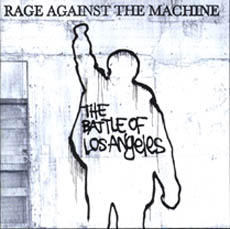
The Battle of Los Angeles
Rage Against the Machine - The Battle of Los Angeles:
Released November, 1999 on Epic records. (Sony)
Produced by: Brendan O'Brian and Rage Against the Machine
Guity Parties: Zack de la Rocha - Vocals, Tom Morello -
Guitars, Tim Bob - Bass, and Brad Wilk - Drums.
Contains tracks: Testify, Guerrilla Radio, Calm Like a Bomb, Mic Check, Sleep Now in the Fire, Born of a Broken Man, Born as Ghosts, Maria, Voice of the Voicless, New Millenium Homes, Ashes in the Fall, War Within a Breath.
Total Running Time: 45:16